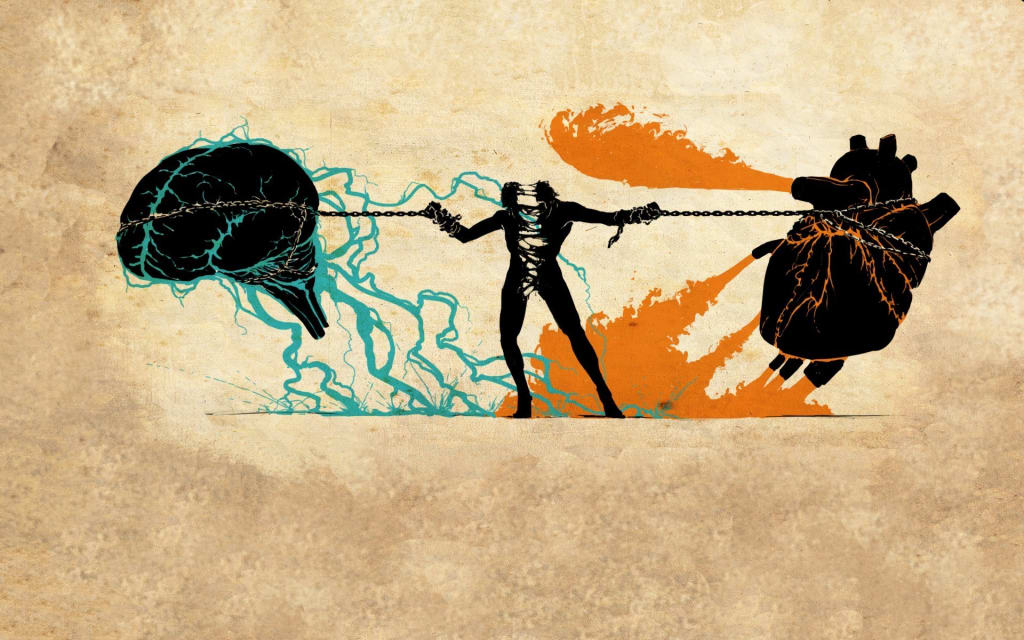Borderline Personality Disorder
Struggling to find the middle ground.

When I found out that I had Borderline Personality Disorder, it was like everything finally made sense. My doctor handed me a book to skim through and I started laughing at how textbook I was. It felt like they wrote a book on my life—I no longer felt alone or, for that matter, unique. After I found out, I went home and read as many articles and books on the disorder as I could get (for free online obviously).
That feeling of relief and understanding quickly changed as I realized how hard it was going to be to try and control this or change. This is my PERSONALITY- the way I feel, behave, and think, but now I know there is a problem with it. I know it sounds silly, but my feelings are hurt. All this time I felt like I was something unique and different and in control of myself. Of course I know that this is not justification for every action I have ever done—but it helps explain certain times when I felt I didn't have control.
One key characteristic of people who have Borderline Personality Disorders are their rocky relationships. I myself have never been close to family or friends but when I am, I am extremely close. Intensity is something that comes up often in people with BPD. I feel the need for constant love, affection, and passion that I cannot satisfy. It is said that people with BPD have an intense need to fill the bottomless hole they feel inside themselves and when that hole can't be filled due to such intense expectations, their partners are met with disappointment and anger.
My relationship with my family and friends has never been stable. My family always treated me with hostility, and I in turn treated my friends with the same love or heat mentality. My first relationship I was pregnant, cheated on, lost the baby, broke up, then ended up dating again. This relationship was a disaster if ever there was one. Most people have horrible relationships at least once in their life—I can definitely say this was young, STUPID love. I personally don't feel like my BPD affected this relationship as in my second one. After my first horrible breakup I feel that I treated my second boyfriend unfairly by creating high standards.
Sometimes I was rash, angry, irrational, and unfair. Of course I didn't feel that I reacted that way and even now it's hard for me to accept that my behavior was less than ideal. However, even though the relationship ended, the friendship has survived.
One personality trait that I feel is most commonly associated with myself is recklessness. When I first heard this, I thought, "well, I'm definitely not a risk taker or anything." But this is not the case. Examples include (and pertain to myself) are impulsive spending, unsafe sex, reckless driving, excessive eating binges, alcohol abuse, self-mutilation, and suicidal behavior. Whenever I partook in any of these things it was to feel wild and alive. I didn't realize it was these things that were killing me. I have been able to stop having unsafe sex and have cut back on impulsive spending, alcohol abuse, self-mutilation, and suicidal behavior. However, at any moment I feel that I could slip.
What if I were to receive $5,000, could I really resist going out and spending all of it? When I do drink it's out of control, even if I don't do it often. And every single time I am slightly inconvenienced I always think about self-mutilation. Knowing it's a constant struggle is part of how to get better—because it doesn't go away.
Part of my personality that people have always enjoyed provoking are my "yo-yo emotions." People with BPD have emotion shifts that are as unpredictable as earthquakes, as stated in BPD for Dummies. I feel like this is an extremely accurate definition of my emotions. I know people have always enjoyed tripping my anger with the smallest actions and then giggling as they run away from my fury.
Knowing that my anger is irrational does not make me feel any different. Even now that I know why I am acting a certain way, it doesn't always help. Being aware of why you feel a certain way doesn't really change the way you feel. There is always a rapidly shifting emotions from one minute, same hour, same day, or in a week. It can go from serenity to rage or despair to joy within seconds.
Another key characteristic, and I feel the most important when explaining to people, is the "black and white" terms of thinking. In every instance they see people, situations, or anything as being one side of the spectrum or the other. People are either all good or evil, life is either amazing or not worth living. Sometimes people with BPD are closer to the edge or reality than others—they can think that other people are plotting against them.
I do find myself paranoid at times and I am so certain of it. Logically I know that what I am thinking is irrational but what if...
So why the heck do I have this personality disorder? What makes me special or broken? Is this my fault? Can I blame someone else? Can it be fixed?
There are 5 theories, and I would like to emphasize theories, or risk factors (according to BPD for Dummies).
- Trauma: People with BPD OFTEN but not ALWAYS have histories of abuse, neglect, or loss.
- Genetics: It tends to run in families.
- Parenting: Some people with BPD report having parents who told them that their feelings weren't important or accurate.
- Culture: Family instability—a culture that fosters individual needs and desires over those of the community.
- Biology: People with BPD appear to have differences in the way their brains work and the way the neurons in their brains communicate.
The main risk factor or theory that I feel impacted me the most is Parenting (#3). Whenever I would cry my mother would say, "you are not a victim." I would always be invalidated. Sometimes I feel like I'm lying when I'm telling the truth. I was always told I was a thief when I was younger even though I wasn't. Whenever I would tell the truth, I was told I was lying. To this day I always feel like I'm lying.
Numbers. A scary number—10 percent of the people with BPD eventually kill themselves, and many more of them seriously injure themselves in suicide attempts.
10% will EVENTUALLY kill themselves. Talk about feeling hopeless. When I saw that I felt like this is me. I fit in that 10 percent because no matter how hard I try, I always seem to slip back into depression. I have always thought I would be dead before I reached college. Now I'm out of college and I still can't picture a future.
I don't plan on killing myself NOW, but EVENTUALLY? I don't want to be part of that 10 percent, but I can't help feeling that's where I belong.
Another scary number—people with severe mental illnesses (like BPD) die young. Studies show that people with BPD live lives that are 20-25 years shorter. This is due to the additional risks people with BPD take.
Looking past these numbers is hard.
One problem I am currently facing is a struggle with my identity—which doesn't sound like something special to people with BPD. How many times do people want to reinvent themselves, find themselves, or become better people? I have no idea who I am. I don't know how I really feel about anything. I don't know what I want, who I want to be, and sometimes I can't even tell who I was.
This short blurb in no way summarizes everything there is to know about people with BPD. I know I said understanding is the first step of the battle, but even understanding or recognizing you are acting a certain way is difficult. When I hate someone, I don't realize that, hey—maybe this is my BPD. When I think about killing myself, it doesn't occur to me that I am losing control of my emotions.
My doctor explained that getting better from BPD is a struggle. It is explained as climbing out of a magma pit on a ladder where every grip is like holding onto razor blades and trying to push yourself up from that. It's going to suck. But it can be done.






Comments
There are no comments for this story
Be the first to respond and start the conversation.